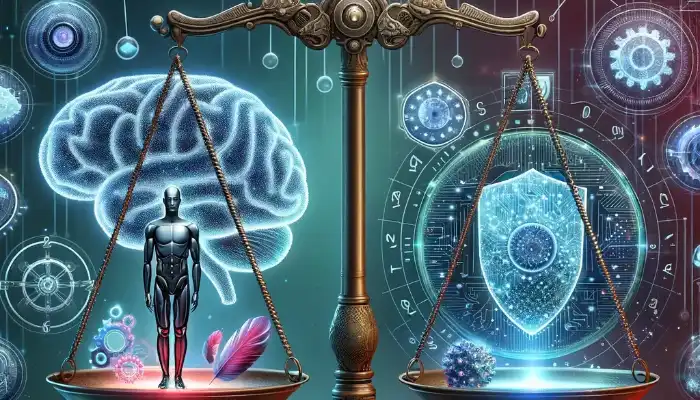Undeniably, Artificial Intelligence (AI) has turned into an uncontrollable force in the world that we live in today. AI is fast-changing industries as well as impacting our daily lives, from facial recognition software to chatbots and self-driving cars. As this technology continues to rise meteorically, one significant topic must dominate: the ethics of AI production.
This article wades into the intricate tango between innovation and responsibility in the AI realm. We will delve into the exciting prospects of improvement in AI while recognizing the ethical challenges that lie ahead. By having these two intertwined concepts, we can develop a path for a future of prosperity and ethics, where AI could be a force for good.

The Power of AI: A Force for Good
In various sectors, AI holds transformational potential because it can offer solutions to some of humans’ most difficult problems, such as these:
- Healthcare: AI-powered tools may provide early disease diagnosis and personalized treatment plans by using medical images with unmatched accuracy.
- Environmental Sustainability: Predicting weather patterns for disaster preparedness, optimizing energy usage using AI algorithms, and analyzing environmental data against climate change—all are possible.
- Education: Personalized learning experiences are made possible by an artificial intelligence tutor whose programs cater directly to unique needs and learning styles.
- Transportation: Self-driving cars promise to significantly reduce traffic accidents and improve transportation efficiency.
These examples barely scratch the surface regarding how powerful Artificial Intelligence can be. They have many applications that can benefit society immensely. Indeed, genuine excitement around innovations in AI explains their fast growth rates over time.
The Ethical Crossroads: Navigating Challenges
Nonetheless, there are several ethical obstacles on the way towards an era dominated by AI technology. For businesses that adopt this new technology not to err concerning key concerns like:
- Transparency and Accountability: However understanding how decisions were reached is quite difficult due to the complexity and opaqueness of AI algorithms. This lack of transparency raises questions about accountability. Who is responsible for any errors made by an AI? We have to develop ways of explaining AI decision-making processes so that they are used responsibly.
- Bias and Fairness: The performance of AI systems depends on training data quality. Unfortunately, datasets often mirror existing social biases. Among others, this can result in discrimination perpetuated by AI in things like loan applications or facial recognition technology. The involvement of bias detection in building fairer and more inclusive AIs is vital.
- Privacy Concerns: AI apps tend to require huge volumes of personal information. There are problems related to data protection and the misuse thereof. To ensure individual privacy within the era of Artificial Intelligence we should therefore introduce robust regulations and safeguards, which should be implemented contemporaneously.
- Impact on Employment: Perhaps one of the biggest fears about AI is that it may replace jobs for humans. Although there will unquestionably be automation from AI, there will also be the creation of new job opportunities. Preparing for an age driven by artificial intelligence requires upskilling and reskilling our workforce.
Finding the Equilibrium: A Future Built on Collaboration
There’s no doubt that AI has so much potential for improving human life. But ignoring ethical considerations would amount to building a house on the sand! Thus, a multifaceted strategy is needed if we want a future with prosperity and ethics:
- Ethical Guidelines and Regulations: Collaboration between the government, AI developers, and industry leaders needs to happen for them to establish AI development ethical guidelines. These guidelines need to address transparency, accountability, and bias mitigation.
- Public Education and Discourse: Open dialogue about AI ethics is critical. Educating the public on what AI can offer as well as its risks will enable people to become more informed and engaged in their communities.
- Human-Centered Design: While creating AI tools, human priorities must be central. Instead of being seen as having the aim of replacing human beings’ potential with machines, they should be looked at as a means of augmenting their abilities.
The Need for Guardrails: Ethical Guidelines and Regulations
To meet this fast-growing pace of artificial intelligence (AI) development, some strong ethical frameworks are needed in relation to this, which are given below:
- Bias: Consequently, the perpetuation of societal biases inherent in training data by these algorithms results in discriminatory outcomes such as those manifested in loan approvals, facial recognition software, or recruitment processes.
- Transparency and Explainability: Frequently operating like “black boxes,” these systems fail to show how they make decisions, reducing trustworthiness while also making it difficult for one to hold them accountable.
- Privacy and Security: As large amounts of information have been required when training such systems, privacy issues are raised because, apart from that, hacking can still take place on the same systems.
- Job displacement: Importantly, there will be massive job losses once Artificial Intelligence takes over the majority of tasks. This requires governments and businesses to focus on reskilling or retraining workers for the jobs of tomorrow.
Industry Taking the Lead: Initiatives for Responsible AI
Luckily enough, technology firms are not sleeping on duty. Notably, several companies have put in place committees that deal with AI ethics, whose concern is coming up with a code of ethics and overseeing its implementation. Additionally, there are industry-wide drives towards developing responsible AI, including the following:
- Partnership on AI: This involves bringing together companies, research organizations, and non-governmental organizations to set standards for artificial intelligence development.
- The Algorithmic Justice League: It pushes for fair, accountable, and transparent design and implementation of artificial intelligence.
This shows some progress in terms of the corporate world’s commitment to tackling the ethical questions facing it.
Addressing Ethical Challenges Through Interdisciplinary Efforts
AI has complex ethical implications that span different dimensions. Hence, these can be effectively addressed by fostering interdisciplinarity. The contributions from various fields include:
- Computer Scientists: They may come up with algorithms for mitigating bias and making AI decision-making processes more transparent.
- Social Scientists: They examine the impact of societal values on people regarding this new technology; any harm or injustice caused by artificial intelligence can be found out through their lenses.
- Ethicists: These provide frameworks within which decisions about machines could be made ethically while also directing the process of aligning AI with human values.
- Legal Scholars: These help in drafting laws that govern how these systems should be built or used.
These varied perspectives foster the open communication and collaboration needed to produce responsible and trustworthy AI.
Real-World Examples: Navigating the Balance
Several companies are struggling to reconcile innovation with the responsible development of AI. Here are some few examples:
For instance:
- Amazon’s Rekognition facial recognition software: This technology has been criticized for racial bias, leading Amazon to implement measures to mitigate this issue.
- IBM’s Watson for Healthcare: It is an AI tool that helps doctors diagnose diseases. To this end, IBM has taken some measures to ensure that the datasets for Watson are broad and representative of different patient groups.
- DeepMind’s AlphaFold protein structure prediction tool: Its discovery could be disruptive to the drug discovery process. Notwithstanding, DeepMind is conscious of such technology misuse and has tried to guide its responsible development.
These cases point out that it is difficult for companies to balance ethical concerns with innovation. They also emphasize the need for ongoing conversations and transparency in tackling these difficulties.
The Ever-Evolving Landscape: Challenges and Future Directions
AI will continue to develop along with emerging ethical dilemmas. There are some areas which have been suggested for continuous attention:
- The Rise of Autonomous Weapons Systems: Concerns about AI-armed weapons have raised serious issues over unintentional casualties as well as humans’ diminished control over lethal force.
- Increasing Power of AI: The more advanced AI systems become, the greater their potential impact on society. We should think about how we can make sure that AI works in humanity’s favor.
- Impact on Human Decision-Making: There should be human control and oversight even when decision-making includes artificial intelligence as an ingredient.
Developing solutions to these challenges will require continued research, public discourse, and collaboration between governments, industry, and civil society.
Conclusion
AI has great potential to enhance our lives, but it also comes with enormous obligations for us. This means that by creating ethical rules, promoting interdisciplinary teamwork, and taking a responsible approach towards development, we can use AI in the best interest of mankind. The future of Artificial Intelligence is not predetermined; it will depend upon decisions made today. We must choose wisely with a commitment towards human well-being, justice, and a future where technological advancement strengthens rather than weakens what makes us human beings.


